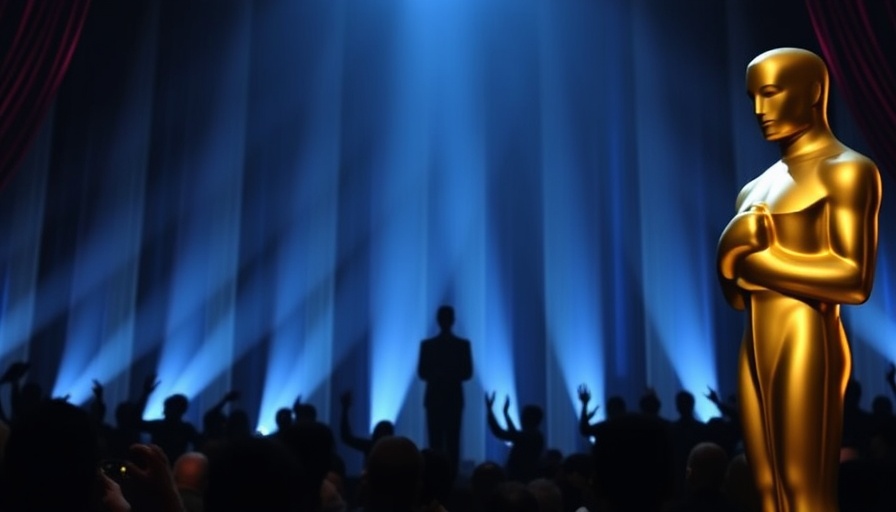
Oscars 2025: A Departure from Political Discourse
This year's Oscars unfolded amidst global chaos, yet the ceremony refrained from engaging in political commentary. Unlike previous years marked by significant discourse, including sharp political critiques during major award shows, the 97th Academy Awards felt more like a subdued reunion—an indication of Hollywood's retreat from contentious conversations. With the tumultuous backdrop of the Trump administration's policies looming large, the absence of overt political dialogue was conspicuous and perhaps alarming.
Reflecting on Past Political Engagements
Looking back, the Oscars have often served as a platform for addressing critical social issues. Take, for example, Michael Moore's notorious acceptance speech for "Bowling for Columbine," where he confronted President George W. Bush. The emotional backlash Moore received underscored the Oscars as a vehement commentary on pressing topics. This year, however, the air was filled with palpable silence. As Conan O’Brien humorously skirted around concerns, asserting that the character Anora was well-received for “standing up to a powerful Russian,” it was evident that this was as far as political dialogue would venture.
Comparing Ceremony Responses: Then and Now
In contrast to the politically charged atmosphere of past ceremonies, such as those during Trump’s first term, the current ceremony was almost apolitical. In the past, presenters like Jimmy Kimmel actively confronted prevailing political issues, making sharp comments about the sitting president. Now, despite nominations related to Trump, like Sebastian Stan's portrayal in "The Apprentice," the night unfolded with humor but minimal substance regarding political tensions. Influential films like “No Other Land,” which depict severe humanitarian issues, were addressed but not highlighted as central points during the ceremony, leading to questions about Hollywood’s current responsibility to voice concern.
The Silent Echo of Political Engagement
The subtle references made by celebrities, such as Zoe Saldaña’s nod to her immigrant roots and Daryl Hannah’s “Slava Ukraine,” signified a divergence from engaging openly with pressing political issues. This layered commentary raises the query: Does celebrity silence indicate complicity in the status quo, or is it a strategy to avoid backlash in a polarized environment? Surely, the creative community should hold the power to influence public opinion, but this reluctance to engage more deeply could reflect an industry hesitant to threaten relationships with audiences or sponsors.
The Importance of Political Engagement in the Arts
As digital nomads exploring the cultural essence of our times, it’s vital to examine how art and politics intersect. Oscars night became an illustrative moment—showcasing how the arts both reflect and shape society. Historically, artists have used their voice to speak against oppressive regimes, advocate for change, and inspire action. The retreat from political discourse at the Oscars represents a missed opportunity to galvanize the audience around crucial societal dilemmas, relegating potentially powerful statements to footnotes in acceptances or light-hearted jokes.
Future Trends: Will Politics Resurface in Hollywood?
The Oscars’ aversion to political commentary may signal a larger trend in the entertainment industry toward drawbridging politics from entertainment. The question looms: will future ceremonies embrace their role as torchbearers for activism? For digital nomads and audiences alike, remains the hope that artistry will reclaim its voice as a vehicle for sincere dialogue rather than merely facilitating entertainment. The success of upcoming films dealing with social justice themes could reignite engagement, pushing awards seasons to confront the pressing issues of our time more directly.
Conclusion: The Road Ahead for Political Discourse
This year’s Oscars acted as a reflective moment within the entertainment sector—illustrating a prevailing hesitation to engage with vital social issues. As observers and participants in a world rife with discord, it's imperative that artists, media, and audiences alike cultivate discussions that are not only engaging but essential in confronting our collective challenges. For those interested in the history and culture of art's intertwining with sociopolitical themes, understanding the implications of this muted ceremony opens avenues for deeper exploration of thematic storytelling in cinema.
Progressively engage in discussions surrounding art and politics—share your thoughts on the portrayal and responsibilities of the creative community when facing social crises!
 Add Row
Add Row  Add
Add 




Write A Comment